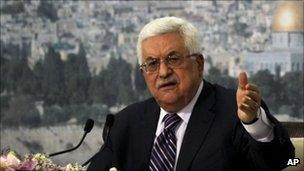What does Abbas hope to achieve with UN state bid?
- Published
- comments
Palestinian President Mahmoud Abbas told his people in a televised address on Friday evening that he plans to ask the United Nations Security Council to upgrade his nation's representation at that international body to that of a member state.

Mr Abbas hopes the move will gain popular support
This represents a strategy of confrontation with the US and involves many risks.
When I was writing earlier this week from New York, I reported the views of diplomats at the UN that the Palestinians might seek the easier path of tabling a resolution in the General Assembly (where America does not have a veto), perhaps also taking the "Vatican option" of raising the Palestinian Territories' status to that just below a full ranking membership of the organisation.
When talking to former US secretary of state Colin Powell and others last week he certainly made the assumption that this issue would play out in the General Assembly rather than the Security Council, external.
Supporters of Mr Abbas argue that the peace process fostered by the US and other Quartet nations was meant to deliver independence by this month, only the UN Security Council can endorse fully fledged membership, and that two years of stalemate in negotiations with Israel have produced intense frustration among Palestinians.
Veto threat
All of this is true, but since US President Barack Obama has already said his country will veto any such Security Council resolution it is worth asking whether Mr Abbas more interested in bringing about a diplomatic confrontation with the US than in gaining this goal for his people.
The most charitable explanation of his actions is perhaps that he believes the US is bluffing or will have to bow to world opinion in the matter.
But since the Palestinian leader has already ignored American pleas not to push ahead, including from two envoys sent at the least minute to meet him, it stands to reason that the White House must now make good its threat to veto or risk losing a great deal of credibility.
Opponents of the Palestinian bid argue that it is a unilateral action that will undermine attempts to negotiate a two state solution, and that it could be little more than an empty gesture even if it succeeded, since it will hardly charge the lives of Palestinians.
Some have argued that it could touch off a wave of violence across the Middle East, and turn the Arab Spring against the US.
11th hour negotiations
No doubt Mr Abbas, who is part of that generation of Arab leaders now feeling the heat of frustration across the region, hopes that he can seize the initiative, gaining popular support in the process.
The denunciation this evening of his bid for full UN membership by his political rivals in the Islamist party Hamas suggests that they too may see that the Palestinian president may be tapping into the anger of his people.
Of course Middle East watchers will be anxiously waiting for the day after the resolution (either being passed or vetoed).
Nobody can predict its exact effects, but it is a fear of the possible consequences that will produce much 11th hour diplomacy on the margins of the UN in New York in an attempt to avoid a clash in the Security Council.